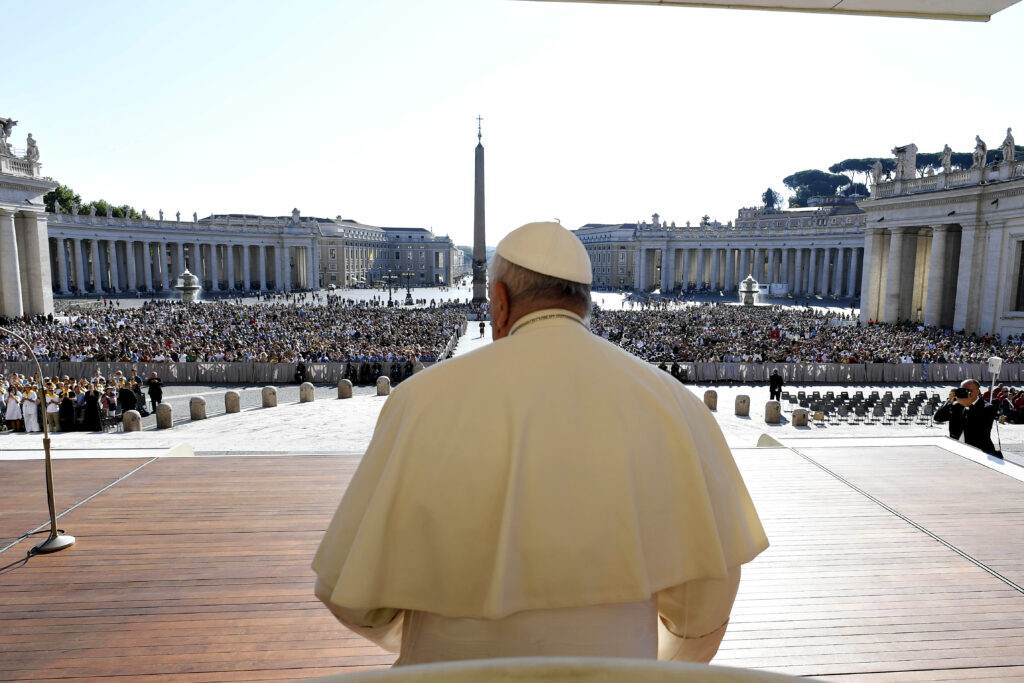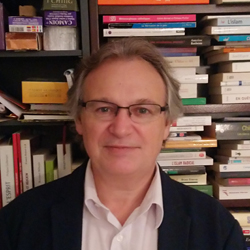Interviews / Geopolitical Observatory of Religion
30 April 2025
The Vatican and Pope Francis’ Legacy: Is the Path Already Set?

The pontificate of Pope Francis, unprecedented in its Latin American dimension and its political commitment to social progress, has left a profound mark on the Catholic Church. Without departing from Church dogma, he broke with his predecessors and raised his voice on an international stage in flux. He worked for the recognition of victims of conflict and climate disruption. Critical of the Western model, his pontificate fits into deeper global dynamics, leaving behind a significant legacy that his successors will inevitably have to reckon with. How should we characterise the twelve years of Francis’ papal reign? To what extent has he broken with the traditional positions of the Catholic Church? What are the key challenges facing the next conclave—and more broadly, the pontificate of his successor? An analysis by François Mabille, associate researcher at IRIS and head of the Geopolitical Observatory of Religion.
Labelled a progressive, what legacy does Pope Francis leave behind?
Pope Francis leaves a complex and contrasting legacy, more pastoral than doctrinal.
On doctrinal matters, Francis did not alter the core principles of Catholic teaching on sexual morality, the family, or the male priesthood. His firm adherence to doctrine on these issues disappointed progressives who had hoped for more decisive breaks.
On a pastoral level, he profoundly transformed the Church’s style of governance, favouring openness and support for all the faithful, including those in so-called “irregular” situations. He promoted an approach grounded more in pastoral care than in normative enforcement.
A key feature of his pontificate is his firm opposition to liberalism—both moral and economic. On the moral front, Francis denounced the individualistic, consumerist, and relativist drift of Western societies, while refusing to soften Catholic doctrine. Economically, he strongly criticised “the idolatry of money” and the “cult of the market”, calling for a fairer and more solidaristic global economic order.
This dual opposition placed him in an uncomfortable position: seen as too rigid by cultural liberals, and too radical by market advocates. This deep tension between spiritual values and the structures of the modern world will be inherited by his successor, who will need to find a balance between fidelity to tradition and the ability to challenge contemporary society.
Beyond its religious dimension, to what extent has Pope Francis’ pontificate shaped the Holy See’s diplomacy? How does the Church view its role after him?
Under Francis, the Holy See’s diplomacy took on a profoundly new direction.
Traditionally based on neutrality and discreet mediation, it became under his leadership more activist and outspoken. Francis wanted the Vatican’s voice to be heard in denouncing global injustices, climate disorder, and the logic of warfare.
A major aspect of this diplomacy is its radical opposition to the Western international order. Francis criticised market liberalism and the “cult of money” as drivers of inequality; politically, he denounced the hegemonic dominance of major Western powers, notably the United States and the European Union; and ideologically, he opposed individualism, moral relativism, and consumerism, which he saw as threats to human dignity and solidarity among peoples.
This critique was not merely rhetorical: it was reflected in strategic choices such as engagement with China, openness to the Global South (BRICS), and a cautious leniency towards Russia until 2021. However, this critical stance left the Holy See diplomatically isolated, lacking strong allies.
Francis’ pontificate was also marked by a pronounced pacifist vision.
He departed from previous diplomatic caution, promoting a radical pacifism evident in three key stances: support for the Treaty on the Prohibition of Nuclear Weapons (TPNW); denunciation of all forms of deterrence, even multilateral ones; and a call for peace founded on fraternity rather than on the balance of terror.
This approach enhanced the pope’s moral authority among public opinion but weakened the Vatican’s traditional diplomatic influence with major strategic powers. The Holy See found itself without real leverage in a world once again defined by power struggles.
After Francis, the Church may need to restore a more balanced diplomacy with renewed modes of action. In this light, the election of a more diplomatic and less activist pope is not out of the question.
To what extent might today’s tense societal and geopolitical contexts influence the election of the next pope? Should we expect a retreat from progressive measures?
The geopolitical context (war, rising US-China tensions, the weakening of multilateralism) and societal climate (deep ideological fractures in the West) are likely to weigh heavily on the next conclave.
Within the Church, several dynamics will compete:
- Conservatives want to refocus the Church on clear doctrinal defence in the face of societal crises.
- Reformers want to continue Francis’ pastoral and open-minded approach.
- Moderates will seek to preserve the fragile unity of the ecclesial body.
The rejection of both moral and economic liberalism, inherited from Francis, will continue to shape future choices.
The next pope will therefore need to continue this critique of the contemporary world, while perhaps being more skilful in rebuilding effective diplomacy and securing new support.
As for “progressive” reforms, the pastoral style of openness is likely to remain, as it is now well embedded. However, one might anticipate, on the one hand, a doctrinal refocusing (more clarity and firmness on key principles) and, on the other, a more discreet, less activist diplomacy to restore the Holy See’s capacity to exert influence behind the scenes in global affairs.

